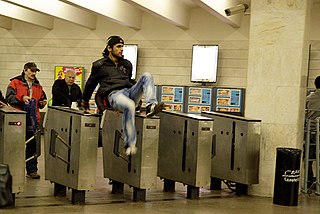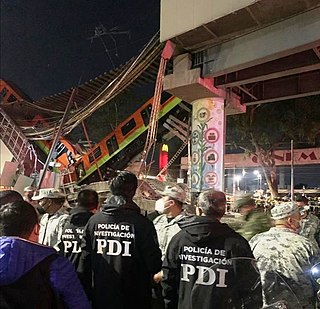Related Research Articles

The MetroCard is a magnetic stripe card used for fare payment on transportation in the New York City area. It is a payment method for the New York City Subway, New York City Transit buses and MTA buses. The MetroCard is also accepted by several partner agencies: Nassau Inter-County Express (NICE), the PATH train system, the Roosevelt Island Tramway, AirTrain JFK, and Westchester County's Bee-Line Bus System.

The Caracas Metro is a mass rapid transit system serving Caracas, Venezuela. It was constructed and is operated by Compañía Anónima Metro de Caracas, a government-owned company that was founded in 1977 by José González-Lander who headed the project for more than thirty years since the early planning stages in the 1960s. Its motto is "Somos parte de tu vida". In 1978 MTA – New York City Transit's R46 #816 was shipped from the Pullman Standard's plant as a sample of rolling stock to be used for the new metro system that was under construction at the time.

The Mexico City Metro is a rapid transit system that serves the metropolitan area of Mexico City, including some municipalities in Mexico State. Operated by the Sistema de Transporte Colectivo (STC), it is the second largest metro system in North America after the New York City Subway. In 2019, the system served 1.655 billion passengers, the tenth highest ridership in the world.

Observatorio is a station on Line 1 of the Mexico City Metro system. It is located in the Álvaro Obregón borough of Mexico City, west of the city centre. This station is the western terminus of Line 1. In 2019, the station had an average ridership of 72,296 passengers per day, making it the eighth busiest station in the network. The station will become the terminal station of Line 12 in December 2023. The station will also connect with Observatorio railway station of the Toluca-Mexico City commuter rail system.

Pantitlán metro station is a Mexico City Metro transfer station in the boroughs of Iztacalco and Venustiano Carranza, in Mexico City. It is a combined underground, at-grade, and elevated station with six island platforms and two side platforms, served by Lines 1, 5, 9, and A. The only quadra-line interchange station in the system, Pantitlán metro station works as the terminal station of all of the lines and is located followed by Zaragoza (Line 1), Hangares (Line 5), Puebla (Line 9), and Agrícola Oriental (Line A) stations. It serves the colonias (neighborhoods) of Ampliación Adolfo López Mateos, Aviación Civil, and Pantitlán; it receives its name from the last one. The station's pictogram features the silhouettes of two flagpoles.
A fare strike is a direct action in which people in a city with a public transit system carry out mass fare evasion as a method of protest. Jumping turnstiles, boarding buses through the back or very quickly through the front, and leaving doors open in subway stations are some tactics used. In some cases, transit operators obstruct the fare box to prevent anyone from paying. Often, fare strikes are used to protest against fare hikes and service cuts, but they can also organize solidarity between riders and drivers.

Transport in Mexico City consists of a variety modes, including the roads, the Mexico City Metro, extensive bus and bus rapid transit systems, as well as the Xochimilco Light Rail and cable cars. The city is serviced by the Benito Juárez International Airport which is supported by the Toluca and Zumpango airports, both in the neighboring State of Mexico. Additionally, like other cities around the world, Mexico City has public taxis, public buses and share taxis and rickshaws. Trajineras, gondola-like boats, service the Xochimilco Lake area. Previously, the city used to operate streetcars. The Greater Mexico City area has additional routes that provide services to the city, including the Tren Suburbano commuter railway, the Mexibús BRT network, and the Mexicable aerial lift system. The transport services are operated by public or private entities but all of them are regulated in the city by the Secretaría de Movilidad.

The Tren Suburbano is an electric suburban rail system in Mexico City. It is operated by Ferrocarriles Suburbanos with concessioned trains from Construcciones y Auxiliar de Ferrocarriles (CAF). It was designed to complement the extensive Mexico City metro system, Latin America's largest and busiest urban rail network.

The fares for services operated under the brands of MTA Regional Bus, New York City Subway, Staten Island Railway (SIR), PATH, Roosevelt Island Tramway, AirTrain JFK, NYC Ferry, and the suburban bus operators Nassau Inter-County Express (NICE) and Westchester County Bee-Line System (Bee-Line) are listed below.

Fare evasion or fare dodging, fare violation, rarely called ticket evasion, is the act of travelling on public transport without paying by deliberately not buying a required ticket to travel. It is considered a problem in many parts of the world, and revenue protection officers and ticket barriers, staffed or automatic, are in place to ensure only those with valid tickets may access the transport. The term fare avoidance is sometimes used as a euphemistic synonym and sometimes used to refer to the lawful use of much cheaper tickets.

Tláhuac metro station is a station of the Mexico City Metro in the colonia of El Triángulo, Tláhuac, Mexico City. It is an at-grade station with two island platforms that serves as the southern terminus of Line 12. The station's pictogram features the glyph of Tláhuac. It is followed by Tlaltenco station, in the same borough. The station was opened on 30 October 2012, on the first day of the service Tláhuac–Mixcoac.

Guillermo López Langarica was a Mexican YouTube celebrity, who accidentally rose to fame in 2007. Prior to his death he was mostly known as 'El Canaca',. More recently he is remembered as 'Don Memo'.

Servicio de Transportes Eléctricos de la Ciudad de México (STE) is a public transport agency responsible for the operation of all trolleybus and light rail services in Mexico City. As its name implies, its routes use only electrically powered vehicles. It was created on 31 December 1946 and is owned by the Mexico City government. STE is overseen by a broader Federal District authority, Secretaría de Transportes y Vialidad, which also regulates the city's other public transport authorities, including Sistema de Transporte Colectivo, Red de Transporte de Pasajeros del Distrito Federal and Metrobús, as well as other forms of transportation in the district. STE's passenger vehicle fleet consists exclusively of trolleybuses, light rail, and aerial lift vehicles, and in 2007 its network carried 88 million passengers, of which 67 million were on trolleybus services and 21 million on light rail.

Miguel Ángel Mancera Espinosa is a Mexican lawyer and politician who works with the Party of the Democratic Revolution (PRD). He served as the Mayor of Mexico City from 2012 to 2018. Mancera graduated from the Faculty of Law of the National Autonomous University of Mexico (UNAM) in 1989, and he was awarded the Gabino Barreda Medal two years later for being the best student of his class. He has a master's degree from the University of Barcelona and the Metropolitan Autonomous University and a Juris Doctor from the UNAM.

Mexibús is a bus rapid transit (BRT) system that is located in the Greater Mexico City part of the State of Mexico, which surrounds Mexico City proper.

Tlaltenco metro station is a Mexico City Metro station in Tláhuac, Mexico City. It is an at-grade station with one island platform, served by Line 12, between Zapotitlán and Tláhuac metro stations. Tlaltenco metro station serves the town of San Francisco Tlaltenco, from which it receives its name. The station's pictogram features a stone gateway known as La Puerta. The station was opened on 30 October 2012, on the first day of the Mixcoac–Tláhuac service.

The Mexico City Metrobús Line 7 is a bus rapid transit line in the Mexico City Metrobús. It operates between Campo Marte in the Miguel Hidalgo borough and Indios Verdes, in Gustavo A. Madero in the northern part of the city. This is the newest line, inaugurated in March 2018.

A series of massive demonstrations and severe riots known in Chile as the Estallido Social, originated in Santiago and took place in all regions of Chile, with a greater impact in the regional capitals, mainly between October 2019 and March 2020. The protests were in response to a raise in the Santiago Metro's subway fare, a probity crisis, cost of living, university graduate unemployment, privatisation and inequality prevalent in the country.

The Sistema de Transporte Público Cablebús, simply branded as Cablebús, is an aerial lift transport system that runs in the Gustavo A. Madero and Iztapalapa areas of Mexico City. It is operated by Servicio de Transportes Eléctricos, the agency responsible for the operation of all trolleybus and light rail services in Mexico City. Line 1 was officially inaugurated on 11 July 2021, going from the Indios Verdes station of the STC Metro to the northern neighborhoods of Gustavo A. Madero. Line 2 runs from the Constitución de 1917 to the Santa Marta STC Metro stations in the southeast of the city.

On 3 May 2021, at 22:22 CDT (UTC−5), an overpass in the borough of Tláhuac carrying Line 12 of the Mexico City Metro collapsed beneath a passing train. The overpass and the last two cars of the train fell onto Tláhuac Avenue near Olivos station, killing 26 people and injuring 98 others. It was the Metro's deadliest accident in almost fifty years.
References
- ↑ Knoll, Andalusia (10 January 2014). ""It's not just 2 pesos; It's the country:" Mexico City's #PosMeSalto Movement Protests Rising Transit Costs". Upside Down World.
- ↑ Wilkinson, Tracy; Sanchez, Cecilia (28 December 2013). "Mexico City subway rate increase enrages commuters". Los Angeles Times.
- ↑ "Ubican a extranjeros en #posmesalto". El Universal (in Mexican Spanish). Retrieved 1 October 2018.
- ↑ "Según El Universal, globalifóbicos brasileños asesoran la protesta del #posmesalto". SDPnoticias.com (in European Spanish). 19 December 2013. Archived from the original on 2 October 2018. Retrieved 1 October 2018.
- ↑ "#PosMeSalto, principal causa de detenciones en el Metro". Publimetro México (in European Spanish). Retrieved 1 October 2018.
- ↑ "Los fails del #PosMeSalto". Sopitas.com (in European Spanish). 13 December 2013. Retrieved 1 October 2018.
- ↑ "Tras el #PosMeSalto, GDF propone multa y arresto si no pagas el Metro Animal Político". www.animalpolitico.com (in European Spanish). Retrieved 1 October 2018.